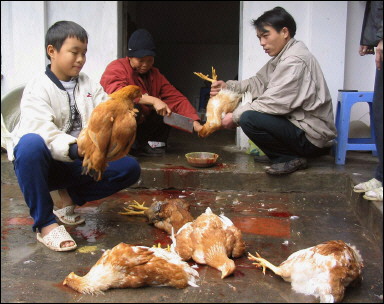Avian Flu Strain Confirmed In Saskatchewan Farm

Winnipeg: Canadian veterinary functionaries stated that they have detected the H7N3 strain of avian influenza on a Saskatchewan farm, but pointed out the virus was not the lethal strain, which researchers fear could result in the next flu plague.
Sandra Stephens, a veterinarian with the Canadian Food Inspection Agency said, “We are not dealing with the H5N1 virus that has been linked to human illness in Asia and other parts of the world.”
The CFIA stated that the H7N3 strain is not generally linked with human illness.
The decision had little impact on farm animals and grain markets. The majority of Canadian poultry is farmed for the domesticated market, and Saskatchewan, famous for its great grain fields, accounts for only a small part of the yield
Paul Aho, an industry consultant with Poultry Perspective said, “It is a mild strain. It doesn't appear to be a big deal.”
Canada informed the World Organization for Animal Health (OIE) regarding the case, plus the US and EU that import a few Canadian poultry products.
The U.S. Department of Agriculture stated that it would banish poultry consignments from Saskatchewan, even though it has not imported poultry from the region since 2005.
John Clifford, the USDA's chief veterinarian said, “We will continue to monitor the situation closely.”
Jim Clark, a senior official with the CFIA said that the H7N3 strain is habitually found in a low-pathogenic form in ducks in North America, and the disease can quickly change into a high-infective form in commercial poultry flocks.
“There is a vast and total difference between an H5 and an H7 subtype,” Clark said in an interview.
The CFIA quarantined the farm, situated northwest of the regional capital of Regina, and will wipe out its heap of 45,000 chickens.
The agency will investigate to see if it can find the cause of the infection, and will test birds within 10 km (6 miles) of the farm, Clark said.
Clark said that there is one more poultry farm within the same area and various small backyard hobby flocks.
Canada had its first major bird flu outburst in 2004 in British Columbia’s thickly populated Fraser Valley. Around 16 million fowl were demolished to block up its spread.
A minor epidemic was also seen in BC in 2005. Canada also detected a nonvirulent form of H5 bird flu in a small backyard poultry flock in the Atlantic province of Prince Edward Island in 2006.
Bird flu almost exclusively infects birds, but it can occasionally cross over to people who closely handle infected poultry.